| This article is part of a series on the |
| United States Senate |
|---|
 |
| History of the United States Senate |
| Members |
|
|
| Politics and procedure |
| Places |
The president pro tempore of the United States Senate (also president pro tem) is the second-highest-ranking official of the United States Senate. Article I, Section Three of the United States Constitution provides that the vice president of the United States, despite not being a senator, is the president of the Senate. It also establishes that the Senate must choose a president pro tempore to act in the absence of the vice president:
The Senate shall choose their other Officers, and also a President pro tempore, in the absence of the Vice President, or when he or she shall exercise the Office of President of the United States.
In practice, neither the vice president nor the president pro tempore usually presides; instead, the duty of presiding officer is rotated among junior senators of the majority party to give them experience in parliamentary procedure.
The president pro tempore is third in the line of succession to the presidency, after the vice president and the speaker of the House of Representatives and ahead of the secretary of state.
Since 1890, the president pro tempore has held the office continuously until the election of another president pro tempore, and since 1945 the most senior senator in the majority party has generally been chosen. During most of the 62nd Congress, following William Frye's resignation on April 27, 1911, five senators—Augustus Bacon, Charles Curtis, Jacob Gallinger, Henry Cabot Lodge, and Frank Brandegee—alternated as president pro tempore.
Since the office was created in 1789, 92 individuals, from 39 of the 50 states, have served as president pro tempore of the Senate. The current president pro tempore is Chuck Grassley of Iowa, who assumed office on January 3, 2025, at the start of the 119th Congress. In 2001, the honorary title of president pro tempore emeritus was created, and it has been given to a senator of the minority party who has previously served as president pro tempore. This title is currently held by Patty Murray of Washington.
Every president pro tempore but one has been a member of a political party or faction; the number affiliated with each is:
- Democratic – 32; Republican – 25; Democratic-Republican – 15; Federalist – 10; Jacksonian – 3; Anti-Administration – 2; National Republican – 2; Pro-Administration – 2; Whig – 2; Independent – 1.
Presidents pro tempore
| Portrait | Name | State | Party | Term | Congress | |
|---|---|---|---|---|---|---|

|
John Langdon | New Hampshire | Pro-Administration | April 6–21, 1789 | 1st Congress | |
| August 7–9, 1789 | ||||||

|
Richard Henry Lee | Virginia | Anti-Administration | April 18 – October 8, 1792 | 2nd Congress | |

|
John Langdon | New Hampshire | Pro-Administration | November 5 – December 4, 1792 | ||
| March 1–3, 1793 | ||||||
| March 4 – December 2, 1793 | 3rd Congress | |||||

|
Ralph Izard | South Carolina | Pro-Administration | May 31 – November 9, 1794 | ||

|
Henry Tazewell | Virginia | Anti-Administration | February 20, 1795 – June 7, 1795 | ||
| Democratic-Republican | 4th Congress | |||||
| December 7–8, 1795 | ||||||

|
Samuel Livermore | New Hampshire | Federalist | May 6 – December 4, 1796 | ||

|
William Bingham | Pennsylvania | Federalist | February 16 – March 3, 1797 | ||

|
William Bradford | Rhode Island | Federalist | July 6 – October 1797 | 5th Congress | |
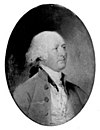
|
Jacob Read | South Carolina | Federalist | November 22 – December 12, 1797 | ||
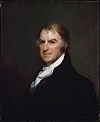
|
Theodore Sedgwick | Massachusetts | Federalist | June 27 – December 5, 1798 | ||

|
John Laurance | New York | Federalist | December 6–27, 1798 | ||
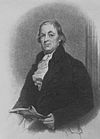
|
James Ross | Pennsylvania | Federalist | March 1 – December 1, 1799 | ||

|
Samuel Livermore | New Hampshire | Federalist | December 2–29, 1799 | 6th Congress | |

|
Uriah Tracy | Connecticut | Federalist | May 14 – November 16, 1800 | ||
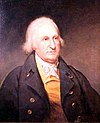
|
John E. Howard | Maryland | Federalist | November 21–27, 1800 | ||

|
James Hillhouse | Connecticut | Federalist | February 28 – March 3, 1801 | ||

|
Abraham Baldwin | Georgia | Democratic-Republican | December 7, 1801 – January 14, 1802 | 7th Congress | |
| April 17 – December 13, 1802 | ||||||

|
Stephen R. Bradley | Vermont | Democratic-Republican | December 14, 1802 – January 18, 1803 | ||
| February 25, 1803 | ||||||
| March 2 – October 16, 1803 | ||||||

|
John Brown | Kentucky | Democratic-Republican | October 17 – December 6, 1803 | 8th Congress | |
| January 23 – February 26, 1804 | ||||||

|
Jesse Franklin | North Carolina | Democratic-Republican | March 10 – November 4, 1804 | ||

|
Joseph Anderson | Tennessee | Democratic-Republican | January 15 – February 3, 1805 | ||
| February 28 – March 2, 1805 | ||||||
| March 2 – December 1, 1805 | ||||||
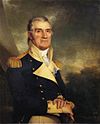
|
Samuel Smith | Maryland | Democratic-Republican | December 2–15, 1805 | 9th Congress | |
| March 18 – November 30, 1806 | ||||||
| March 2 – October 25, 1807 | ||||||
| April 16 – November 6, 1808 | 10th Congress | |||||

|
Stephen R. Bradley | Vermont | Democratic-Republican | December 28, 1808 – January 8, 1809 | ||

|
John Milledge | Georgia | Democratic-Republican | January 30 – March 3, 1809 | ||
| March 4 – May 21, 1809 | 11th Congress | |||||
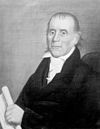
|
Andrew Gregg | Pennsylvania | Democratic-Republican | June 26 – December 18, 1809 | ||

|
John Gaillard | South Carolina | Democratic-Republican | February 28 – March 2, 1810 | ||
| April 17 – December 11, 1810 | ||||||

|
John Pope | Kentucky | Democratic-Republican | February 23 – November 3, 1811 | ||

|
William H. Crawford | Georgia | Democratic-Republican | March 24, 1812 – March 3, 1813 | 12th Congress | |
| March 4–23, 1813 | 13th Congress | |||||
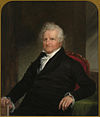
|
Joseph B. Varnum | Massachusetts | Democratic-Republican | December 6, 1813 – February 3, 1814 | ||

|
John Gaillard | South Carolina | Democratic-Republican | April 18 – November 25, 1814 | ||
| November 25, 1814 – December 3, 1815 | ||||||
| December 4, 1815 – March 3, 1817 | 14th Congress | |||||
| March 4, 1817 | 15th Congress | |||||
| March 6, 1817 – February 18, 1818 | ||||||
| March 31, 1818 – January 5, 1819 | ||||||
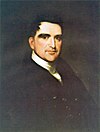
|
James Barbour | Virginia | Democratic-Republican | February 15 – December 5, 1819 | ||
| December 6–26, 1819 | 16th Congress | |||||

|
John Gaillard | South Carolina | Democratic-Republican | January 25, 1820 – December 2, 1821 | ||
| December 3–27, 1821 | 17th Congress | |||||
| February 1 – December 2, 1822 | ||||||
| February 19 – November 30, 1823 | ||||||
| December 1, 1823 – January 20, 1824 | 18th Congress | |||||
| May 21, 1824 – March 3, 1825 | ||||||
| March 9 – December 4, 1825 | 19th Congress | |||||

|
Nathaniel Macon | North Carolina | Democratic-Republican | May 20 – December 3, 1826 | ||
| January 2 – February 13, 1827 | ||||||
| March 2 – December 2, 1827 | ||||||

|
Samuel Smith | Maryland | Jacksonian | May 15 – December 18, 1828 | 20th Congress | |
| March 13 – December 10, 1829 | 21st Congress | |||||
| May 20 – December 31, 1830 | ||||||
| March 1 – December 4, 1831 | ||||||
| December 5–11, 1831 | 22nd Congress | |||||

|
Littleton Tazewell | Virginia | Jacksonian | July 9–16, 1832 | ||

|
Hugh Lawson White | Tennessee | Jacksonian | December 3, 1832 – December 1, 1833 | ||
| December 2–15, 1833 | 23rd Congress | |||||

|
George Poindexter | Mississippi | National Republican | June 28 – November 30, 1834 | ||
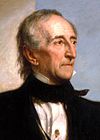
|
John Tyler | Virginia | National Republican | March 3 – December 6, 1835 | 24th Congress | |
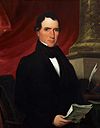
|
William R. King | Alabama | Democratic | July 1 – December 4, 1836 | ||
| January 28 – March 3, 1837 | ||||||
| March 7 – September 3, 1837 | 25th Congress | |||||
| October 13 – December 3, 1837 | ||||||
| July 2 – December 18, 1838 | ||||||
| February 25 – December 1, 1839 | ||||||
| December 2–26, 1839 | 26th Congress | |||||
| July – December 15, 1840 | ||||||
| March 3, 1841 | ||||||
| March 4, 1841 | 27th Congress | |||||

|
Samuel Southard | New Jersey | Whig | March 11, 1841 – May 31, 1842 | ||
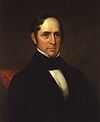
|
Willie P. Mangum | North Carolina | Whig | May 31, 1842 – December 3, 1843 | ||
| December 4, 1843 – March 3, 1845 | 28th Congress | |||||
| March 4, 1845 | 29th Congress | |||||

|
Ambrose H. Sevier | Arkansas | Democratic | December 27, 1845 | ||
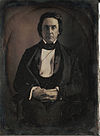
|
David R. Atchison | Missouri | Democratic | August 8 – December 6, 1846 | ||
| January 11–13, 1847 | ||||||
| March 3 – December 5, 1847 | ||||||
| February 2–8, 1848 | 30th Congress | |||||
| June 1–14, 1848 | ||||||
| June 26 – July 29, 1848 | ||||||
| July 29 – December 4, 1848 | ||||||
| December 26, 1848 – January 1, 1849 | ||||||
| March 2–4, 1849 | ||||||
| March 5, 1849 | 31st Congress | |||||
| March 16 – December 2, 1849 | ||||||

|
William R. King | Alabama | Democratic | May 6–19, 1850 | ||
| July 11, 1850 – March 3, 1851 | ||||||
| March 4, 1851 – December 20, 1852 | 32nd Congress | |||||

|
David R. Atchison | Missouri | Democratic | December 20, 1852 – March 3, 1853 | ||
| March 4, 1853 – December 4, 1854 | 33rd Congress | |||||
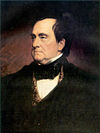
|
Lewis Cass | Michigan | Democratic | December 4, 1854 | ||
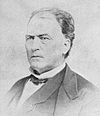
|
Jesse D. Bright | Indiana | Democratic | December 5, 1854 – December 2, 1855 | ||
| December 5, 1855 –June 9, 1856 | 34th Congress | |||||

|
Charles E. Stuart | Michigan | Democratic | June 9 – June 10, 1856 | ||

|
Jesse D. Bright | Indiana | Democratic | June 11, 1856 – January 6, 1857 | ||

|
James M. Mason | Virginia | Democratic | January 6 – March 3, 1857 | ||
| March 4, 1857 | 35th Congress | |||||

|
Thomas J. Rusk | Texas | Democratic | March 14 – July 29, 1857 | ||

|
Benjamin Fitzpatrick | Alabama | Democratic | December 7–20, 1857 | ||
| March 29 – May 2, 1858 | ||||||
| June 14 – December 5, 1858 | ||||||
| January 19, 1859 | ||||||
| January 25 – February 9, 1859 | ||||||
| March 9 – December 4, 1859 | 36th Congress | |||||
| December 19, 1859 – January 15, 1860 | ||||||
| February 20–26, 1860 | ||||||

|
Jesse D. Bright | Indiana | Democratic | June 12 – June 26, 1860 | ||

|
Benjamin Fitzpatrick | Alabama | Democratic | June 26 – December 2, 1860 | ||

|
Solomon Foot | Vermont | Republican | February 16–17, 1861 | ||
| March 23 – July 3, 1861 | 37th Congress | |||||
| July 18 – December 1, 1861 | ||||||
| January 15, 1862 | ||||||
| March 31 – May 21, 1862 | ||||||
| June 19 – December 12, 1862 | ||||||
| February 18 – March 3, 1863 | ||||||
| March 4 – December 6, 1863 | 38th Congress | |||||
| December 18–20, 1863 | ||||||
| February 23, 1864 | ||||||
| March 11–13, 1864 | ||||||
| April 11–13, 1864 | ||||||

|
Daniel Clark | New Hampshire | Republican | April 26, 1864 – January 4, 1865 | ||
| February 9–19, 1865 | ||||||
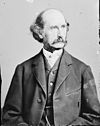
|
Lafayette S. Foster | Connecticut | Republican | March 7, 1865 – March 2, 1867 | 39th Congress | |
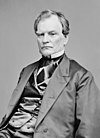
|
Benjamin F. Wade | Ohio | Republican | March 2–3, 1867 | ||
| March 4, 1867 – March 3, 1869 | 40th Congress | |||||

|
Henry B. Anthony | Rhode Island | Republican | March 23–28, 1869 | 41st Congress | |
| April 9 – December 5, 1869 | ||||||
| May 28 – June 2, 1870 | ||||||
| July 1–5, 1870 | ||||||
| July 14 – December 4, 1870 | ||||||
| March 10–12, 1871 | 42nd Congress | |||||
| April 17 – May 9, 1871 | ||||||
| May 23 – December 3, 1871 | ||||||
| December 21, 1871 – January 7, 1872 | ||||||
| February 23–25, 1872 | ||||||
| June 8 – December 1, 1872 | ||||||
| December 4–8, 1872 | ||||||
| December 13–15, 1872 | ||||||
| December 20, 1872 – January 5, 1873 | ||||||
| January 24, 1873 | ||||||

|
Matthew H. Carpenter | Wisconsin | Republican | March 12–13, 1873 | 43rd Congress | |
| March 26 – November 30, 1873 | ||||||
| December 11, 1873 – December 6, 1874 | ||||||
| December 23, 1874 – January 4, 1875 | ||||||

|
Henry B. Anthony | Rhode Island | Republican | January 25–31, 1875 | ||
| February 15–17, 1875 | ||||||
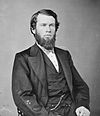
|
Thomas W. Ferry | Michigan | Republican | March 9–10, 1875 | 44th Congress | |
| March 19 – December 20, 1875 | ||||||
| December 20, 1875 – March 4, 1877 | ||||||
| March 5, 1877 | 45th Congress | |||||
| February 26 – March 3, 1878 | ||||||
| April 17 – December 1, 1878 | ||||||
| March 3–17, 1879 | ||||||

|
Allen G. Thurman | Ohio | Democratic | April 15 – November 30, 1879 | 46th Congress | |
| April 7–14, 1880 | ||||||
| May 6 – December 5, 1880 | ||||||

|
Thomas F. Bayard, Sr. | Delaware | Democratic | October 10–13, 1881 | 47th Congress | |
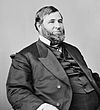
|
David Davis | Illinois | Independent | October 13, 1881 – March 3, 1883 | ||

|
George F. Edmunds | Vermont | Republican | March 3 – December 2, 1883 | ||
| December 3, 1883 – January 14, 1884 | 48th Congress | |||||
| January 14, 1884 – March 3, 1885 | ||||||

|
John Sherman | Ohio | Republican | December 7, 1885 – February 26, 1887 | 49th Congress | |

|
John James Ingalls | Kansas | Republican | February 26 – December 4, 1887 | ||
| December 5, 1887 – March 3, 1889 | 50th Congress | |||||
| March 7–17, 1889 | 51st Congress | |||||
| April 2 – December 1, 1889 | ||||||
| December 5–10, 1889 | ||||||
| February 28 – March 18, 1890 | ||||||
| April 3, 1890 – March 2, 1891 | ||||||
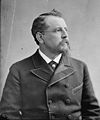
|
Charles F. Manderson | Nebraska | Republican | March 2 – December 6, 1891 | ||
| December 7, 1891 – March 3, 1893 | 52nd Congress | |||||
| March 4–22, 1893 | 53rd Congress | |||||

|
Isham G. Harris | Tennessee | Democratic | March 22, 1893 – January 7, 1895 | ||

|
Matt W. Ransom | North Carolina | Democratic | January 7–10, 1895 | ||

|
Isham G. Harris | Tennessee | Democratic | January 10 – March 3, 1895 | ||

|
William P. Frye | Maine | Republican | February 7, 1896 – March 3, 1897 | 54th Congress | |
| March 4, 1897 – December 3, 1899 | 55th Congress | |||||
| December 4, 1899 – March 3, 1901 | 56th Congress | |||||
| March 7, 1901 – March 4, 1903 | 57th Congress | |||||
| March 5, 1903 – March 3, 1905 | 58th Congress | |||||
| March 4, 1905 – March 3, 1907 | 59th Congress | |||||
| December 5, 1907 – March 3, 1909 | 60th Congress | |||||
| March 4, 1909 – April 3, 1911 | 61st Congress | |||||
| April 4–27, 1911 | 62nd Congress | |||||

|
Augustus O. Bacon | Georgia | Democratic | August 14, 1911 | ||

|
Charles Curtis | Kansas | Republican | December 4–12, 1911 | ||

|
Augustus O. Bacon | Georgia | Democratic | January 15–17, 1912 | ||
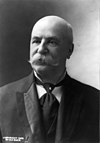
|
Jacob H. Gallinger | New Hampshire | Republican | February 12–14, 1912 | ||

|
Augustus O. Bacon | Georgia | Democratic | March 11–12, 1912 | ||

|
Frank B. Brandegee | Connecticut | Republican | March 25–26, 1912 | ||

|
Augustus O. Bacon | Georgia | Democratic | April 8, 1912 | ||

|
Jacob H. Gallinger | New Hampshire | Republican | April 26–27, 1912; May 7, 1912 | ||

|
Augustus O. Bacon | Georgia | Democratic | May 10, 1912 | ||

|
Henry Cabot Lodge | Massachusetts | Republican | May 25, 1912 | ||

|
Augustus O. Bacon | Georgia | Democratic | May 30 – June 3, 1912; June 13 – July 5, 1912 | ||

|
Jacob H. Gallinger | New Hampshire | Republican | July 6–31, 1912 | ||

|
Augustus O. Bacon | Georgia | Democratic | August 1–10, 1912 | ||

|
Jacob H. Gallinger | New Hampshire | Republican | August 12–26, 1912 | ||

|
Augustus O. Bacon | Georgia | Democratic | August 27 – December 15, 1912 | ||

|
Jacob H. Gallinger | New Hampshire | Republican | December 16, 1912, and January 4, 1913 | ||

|
Augustus O. Bacon | Georgia | Democratic | January 5–18, 1913 | ||

|
Jacob H. Gallinger | New Hampshire | Republican | January 19 – February 1, 1913 | ||

|
Augustus O. Bacon | Georgia | Democratic | February 2–15, 1913 | ||

|
Jacob H. Gallinger | New Hampshire | Republican | February 16 – March 3, 1913 | ||
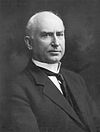
|
James Paul Clarke | Arkansas | Democratic | March 13, 1913 – March 3, 1915 | 63rd Congress | |
| December 6, 1915 – October 1, 1916 | 64th Congress | |||||

|
Willard Saulsbury Jr. | Delaware | Democratic | December 14, 1916 – March 4, 1917 | ||
| March 5, 1917 – March 3, 1919 | 65th Congress | |||||

|
Albert B. Cummins | Iowa | Republican | May 19, 1919 – March 3, 1921 | 66th Congress | |
| March 7, 1921 – December 2, 1923 | 67th Congress | |||||
| December 3, 1923 – March 3, 1925 | 68th Congress | |||||
| March 4–6, 1925 | 69th Congress | |||||

|
George H. Moses | New Hampshire | Republican | March 6, 1925 – March 4, 1927 | ||
| December 15, 1927 – March 3, 1929 | 70th Congress | |||||
| March 4, 1929 – December 6, 1931 | 71st Congress | |||||
| December 7, 1931 – March 3, 1933 | 72nd Congress | |||||

|
Key Pittman | Nevada | Democratic | March 9, 1933 – January 2, 1935 | 73rd Congress | |
| January 7, 1935 – January 4, 1937 | 74th Congress | |||||
| January 5, 1937 – January 2, 1939 | 75th Congress | |||||
| January 3, 1939 – November 10, 1940 | 76th Congress | |||||

|
William H. King | Utah | Democratic | November 19, 1940 – January 3, 1941 | ||

|
Pat Harrison | Mississippi | Democratic | January 6 – June 22, 1941 | 77th Congress | |
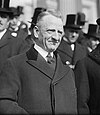
|
Carter Glass | Virginia | Democratic | July 10, 1941 – January 5, 1943 | ||
| January 14, 1943 – January 2, 1945 | 78th Congress | |||||
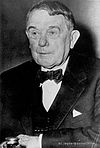
|
Kenneth McKellar | Tennessee | Democratic | January 6, 1945 – January 2, 1947 | 79th Congress | |

|
Arthur H. Vandenberg | Michigan | Republican | January 4, 1947 – January 2, 1949 | 80th Congress | |

|
Kenneth McKellar | Tennessee | Democratic | January 3, 1949 – January 2, 1951 | 81st Congress | |
| January 3, 1951 – January 2, 1953 | 82nd Congress | |||||

|
Styles Bridges | New Hampshire | Republican | January 3, 1953 – January 4, 1955 | 83rd Congress | |

|
Walter F. George | Georgia | Democratic | January 5, 1955 – January 2, 1957 | 84th Congress | |

|
Carl Hayden | Arizona | Democratic | January 3, 1957 – January 6, 1959 | 85th Congress | |
| January 7, 1959 – January 2, 1961 | 86th Congress | |||||
| January 3, 1961 – January 8, 1963 | 87th Congress | |||||
| January 9, 1963 – January 3, 1965 | 88th Congress | |||||
| January 4, 1965 – January 9, 1967 | 89th Congress | |||||
| January 10, 1967 – January 2, 1969 | 90th Congress | |||||

|
Richard Russell Jr. | Georgia | Democratic | January 3, 1969 – January 3, 1971 | 91st Congress | |
| January 3, 1971 – January 21, 1971 | 92nd Congress | |||||

|
Allen J. Ellender | Louisiana | Democratic | January 22, 1971 – July 27, 1972 | ||

|
James Eastland | Mississippi | Democratic | July 28, 1972 – January 2, 1973 | ||
| January 3, 1973 – January 13, 1975 | 93rd Congress | |||||
| January 14, 1975 – January 3, 1977 | 94th Congress | |||||
| January 4, 1977 – December 27, 1978 | 95th Congress | |||||

|
Warren Magnuson | Washington | Democratic | January 15, 1979 – December 4, 1980 | 96th Congress | |
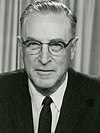
|
Milton Young | North Dakota | Republican | December 5, 1980 | ||

|
Warren Magnuson | Washington | Democratic | December 6, 1980 – January 4, 1981 | ||

|
Strom Thurmond | South Carolina | Republican | January 5, 1981 – January 2, 1983 | 97th Congress | |
| January 3, 1983 – January 2, 1985 | 98th Congress | |||||
| January 3, 1985 – January 5, 1987 | 99th Congress | |||||

|
John C. Stennis | Mississippi | Democratic | January 6, 1987 – January 3, 1989 | 100th Congress | |
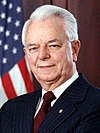
|
Robert Byrd | West Virginia | Democratic | January 3, 1989 – January 2, 1991 | 101st Congress | |
| January 3, 1991 – January 4, 1993 | 102nd Congress | |||||
| January 5, 1993 – January 3, 1995 | 103rd Congress | |||||

|
Strom Thurmond | South Carolina | Republican | January 4, 1995 – January 6, 1997 | 104th Congress | |
| January 7, 1997 – January 6, 1999 | 105th Congress | |||||
| January 7, 1999 – January 3, 2001 | 106th Congress | |||||

|
Robert Byrd | West Virginia | Democratic | January 3–20, 2001 | 107th Congress | |

|
Strom Thurmond | South Carolina | Republican | January 20 – June 6, 2001 | ||

|
Robert Byrd | West Virginia | Democratic | June 6, 2001 – January 3, 2003 | ||

|
Ted Stevens | Alaska | Republican | January 3, 2003 – January 3, 2005 | 108th Congress | |
| January 3, 2005 – January 4, 2007 | 109th Congress | |||||

|
Robert Byrd | West Virginia | Democratic | January 4, 2007 – January 3, 2009 | 110th Congress | |
| January 3, 2009 – June 28, 2010 | 111th Congress | |||||

|
Daniel Inouye | Hawaii | Democratic | June 28, 2010 – January 5, 2011 | ||
| January 5, 2011 – December 17, 2012 | 112th Congress | |||||

|
Patrick Leahy | Vermont | Democratic | December 17, 2012 – January 3, 2013 | ||
| January 3, 2013 – January 3, 2015 | 113th Congress | |||||
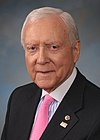
|
Orrin Hatch | Utah | Republican | January 3, 2015 – January 3, 2017 | 114th Congress | |
| January 3, 2017 – January 3, 2019 | 115th Congress | |||||

|
Chuck Grassley | Iowa | Republican | January 3, 2019 – January 3, 2021 | 116th Congress | |
| January 3, 2021 – January 20, 2021 | 117th Congress | |||||

|
Patrick Leahy | Vermont | Democratic | January 20, 2021 – January 3, 2023 | ||
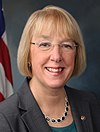
|
Patty Murray | Washington | Democratic | January 3, 2023 – January 3, 2025 | 118th Congress | |

|
Chuck Grassley | Iowa | Republican | January 3, 2025 – present | 119th Congress | |
Notes
- ^ Henry Tazewell was affiliated with the Anti-Administration bloc prior to formation of the Democratic-Republican Party.
- ^ Samuel Smith was a member of the Democratic–Republican Party until it became fractured, at which time he sided with its pro-Jackson faction.
- Served during a vacancy in the vice presidency, April 6–21, 1789, prior to the inauguration of John Adams.
- Served during a vacancy in the vice presidency, April 20, 1812–March 4, 1813, following the death of George Clinton.
- Served during a vacancy in the vice presidency, November 23, 1814–March 4, 1817, following the death of Elbridge Gerry.
- Served during a vacancy in the vice presidency, December 28, 1832–March 4, 1833, following the resignation of John C. Calhoun.
- ^ Served during a vacancy in the vice presidency, April 4, 1841–March 4, 1845, after John Tyler succeeded to the presidency.
- Ambrose H. Sevier was not elected as president pro tempore in an official manner, but permitted to occupy the chair for the day.
- ^ Served during a vacancy in the vice presidency, July 9, 1850–March 4, 1853, after Millard Fillmore succeeded to the presidency.
- ^ Served during a vacancy in the vice presidency, April 18, 1853–March 4, 1857, following the death of William R. King.
- ^ Served during a vacancy in the vice presidency, April 15, 1865–March 4, 1869, after Andrew Johnson succeeded to presidency.
- Served during a vacancy in the vice presidency, November 22, 1875–March 4, 1877, following the death of Henry Wilson.
- ^ Served during a vacancy in the vice presidency, September 19, 1881–March 4, 1885, after Chester A. Arthur succeeded to presidency.
- ^ Served during a vacancy in the vice presidency, November 25, 1885–March 4, 1889, following the death of Thomas A. Hendricks.
- Served during a vacancy in the vice presidency, November 21, 1899–March 4, 1901, following the death of Garret Hobart.
- Served during a vacancy in the vice presidency, September 14, 1901–March 4, 1905, after Theodore Roosevelt succeeded to presidency.
- ^ Served during a vacancy in the vice presidency, October 30, 1912–March 4, 1913, following the death of James S. Sherman.
- Served during a vacancy in the vice presidency, August 2, 1923–March 4, 1925, after Calvin Coolidge succeeded to presidency.
- ^ Served during a vacancy in the vice presidency, April 12, 1945–January 20, 1949, after Harry S. Truman succeeded to presidency.
- Served during a vacancy in the vice presidency, November 22, 1963–January 20, 1965, after Lyndon B. Johnson succeeded to presidency.
- Served during a vacancy in the vice presidency, October 10, 1973–December 6, 1973, following the resignation of Spiro Agnew.
- Served during a vacancy in the vice presidency, August 9, 1974–December 19, 1974, after Gerald Ford succeeded to presidency.
President pro tempore emeritus
In 2001, the honorary title of president pro tempore emeritus was created. It has subsequently been bestowed upon a senator of the minority party who has previously served as president pro tempore.
| Portrait | Name | State | Party | Term | Congress | |
|---|---|---|---|---|---|---|

|
Strom Thurmond | South Carolina | Republican | June 6, 2001 – January 3, 2003 | 107th Congress | |

|
Robert Byrd | West Virginia | Democratic | January 3, 2003 – January 3, 2007 | 108th Congress 109th Congress | |

|
Ted Stevens | Alaska | Republican | January 3, 2007 – January 3, 2009 | 110th Congress | |
| Vacant January 3, 2009 – January 3, 2015 (No senator was eligible for the position.) |
111th Congress 112th Congress 113th Congress | |||||

|
Patrick Leahy | Vermont | Democratic | January 3, 2015 – January 20, 2021 | 114th Congress 115th Congress 116th Congress 117th Congress | |

|
Chuck Grassley | Iowa | Republican | January 20, 2021 – January 3, 2025 | 117th Congress 118th Congress | |

|
Patty Murray | Washington | Democratic | January 3, 2025 – present | 119th Congress | |
See also
- Dean of the United States Senate
- History of the United States Senate
- Seniority in the United States Senate
- List of current presidents of legislatures, presiding officers of legislative assemblies worldwide
References
- Gill, Kathy. "US Senate Organization". The New York Times Company. Retrieved October 19, 2009 – via About.com.
- Mount, Steve. "Constitutional Topic: Presidential Line of Succession". USConstitution.net. Steve Mount. Retrieved October 19, 2009.
- ^ Davis, Christopher M. (December 20, 2012). The President Pro Tempore of the Senate: History and Authority of the Office (Report). Congressional Research Service. Retrieved February 23, 2015.
![]() This article incorporates public domain material from About the President Pro Tempore. United States Senate.
This article incorporates public domain material from About the President Pro Tempore. United States Senate.